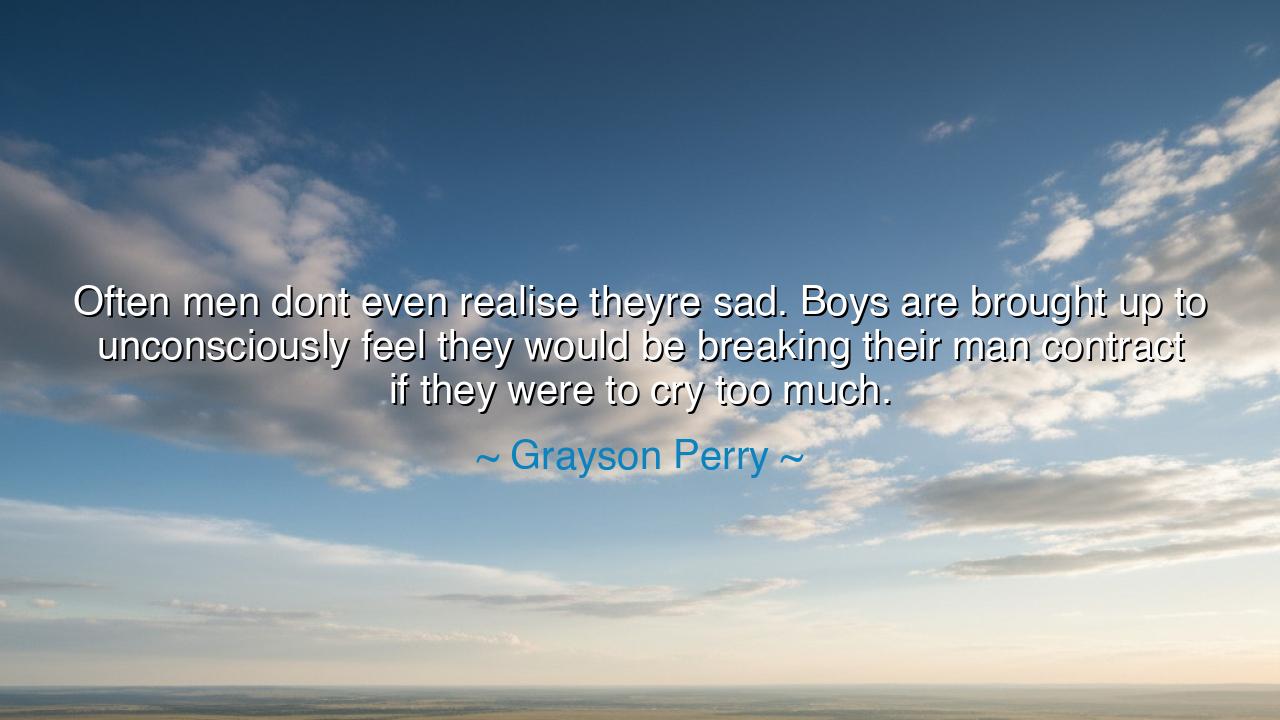
Often men dont even realise theyre sad. Boys are brought up to
Often men dont even realise theyre sad. Boys are brought up to unconsciously feel they would be breaking their man contract if they were to cry too much.






Hear the words of Grayson Perry, spoken with both sorrow and clarity: “Often men don’t even realise they’re sad. Boys are brought up to unconsciously feel they would be breaking their man contract if they were to cry too much.” In this saying is revealed a wound not of the body but of the soul—a burden placed upon countless men by the weight of tradition, silence, and pride. It is not nature that denies them tears, but culture. It is not weakness that hides their sadness, but the false belief that strength demands silence.
The meaning of Perry’s words lies in the truth that from childhood, many boys are trained not to feel, or at least not to show what they feel. They are told, “Be strong,” when they wish to weep. They are told, “Man up,” when they feel fear. They are told, “Don’t cry,” as though tears were poison. Thus, a hidden contract is written upon their hearts, one they never agreed to sign, but which they carry nonetheless: the man contract that demands stoicism, silence, and the denial of their own humanity.
The ancients themselves wrestled with this paradox. In the Iliad, mighty Achilles, greatest of warriors, does not only rage but weep. He weeps for Patroclus, for the loss of his companion, and even for the futility of life itself. His tears do not make him lesser; they make him more human, more noble, more eternal. Yet as centuries passed, cultures hardened, and the idea grew that the ideal man must be made of stone. Perry calls this out as falsehood—for to deny sadness is not to conquer it, but to be consumed by it in secret.
History gives us countless examples of the damage wrought by this silence. Think of the soldiers of the Great War, returning from the trenches scarred in body and soul. Many were told to hide their pain, to be men, to endure in silence. They did not cry, but inside they carried the weight of nightmares, broken spirits, and sorrow unspoken. How many lives were lost not to battle, but to the crushing force of unexpressed sadness? This is the tragedy of the man contract: that it saves no one, but destroys many.
And yet, even amidst this darkness, there are examples of courage—not only on the battlefield, but in the heart. Consider Abraham Lincoln, who, though burdened with melancholy, did not deny it. His sorrow became the soil of his compassion, the depth of his speeches, the strength of his leadership. He showed the world that one may feel deeply and yet stand firm. His greatness was not born of hiding tears, but of allowing his sadness to become wisdom.
The lesson, O seeker, is this: the true measure of a man—or of any human—is not in the absence of tears, but in the courage to face them. To feel is not to break the man contract, but to break the chains of falsehood. Those who deny their sadness often live as shadows of themselves, but those who acknowledge it grow in depth, in empathy, and in truth. Strength is not silence; strength is honesty.
Practical is this counsel: if you are a man, allow yourself to name your sorrow when it comes. If you are a parent, do not forbid your sons their tears, but guide them to see that emotion is not weakness but life itself. And if you are a friend, a partner, or a brother, create space where men may speak openly without fear of shame. For every tear shed in truth becomes a step toward healing—not only for the individual, but for the world.
Thus Grayson Perry’s words stand as both warning and invitation: “Often men don’t even realise they’re sad… they would be breaking their man contract if they were to cry too much.” Let us cast away this false contract and write a new one: that to be human is to feel, to cry is to cleanse, and to face sorrow openly is the path to wisdom and to freedom.






AAdministratorAdministrator
Welcome, honored guests. Please leave a comment, we will respond soon